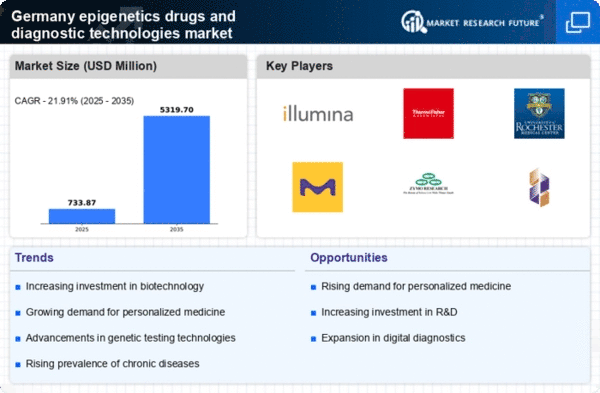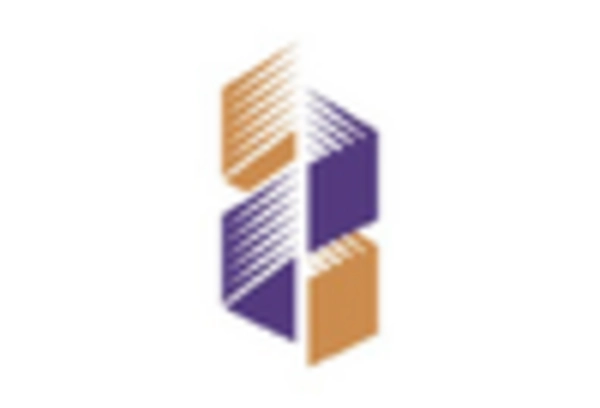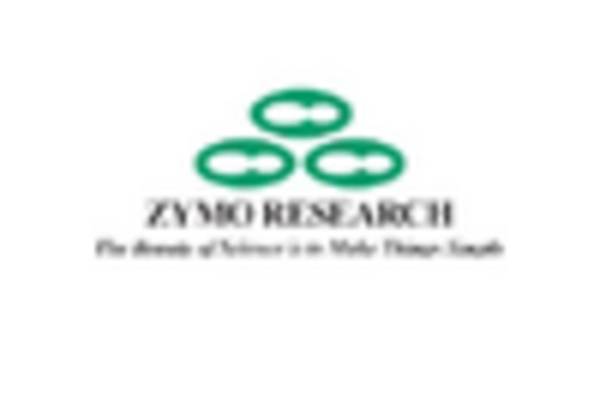Supportive Regulatory Environment
The regulatory landscape in Germany is becoming increasingly supportive of innovations in the epigenetics market. Regulatory bodies are actively working to streamline the approval processes for new epigenetic therapies and diagnostics, which encourages investment and research in this field. The European Medicines Agency (EMA) has established guidelines that facilitate the development of epigenetic-based treatments, providing a clear framework for companies to navigate. This supportive environment is likely to enhance the competitiveness of the German market, attracting both domestic and international players. As regulatory hurdles diminish, the epigenetics drugs-diagnostic-technologies market is expected to experience accelerated growth, with more products entering the market and improving patient care.
Advancements in Genomic Technologies
Technological advancements in genomic sequencing and analysis are propelling the epigenetics market forward in Germany. Innovations such as next-generation sequencing (NGS) and CRISPR gene editing are enhancing the understanding of epigenetic modifications and their implications in various diseases. The German biotechnology sector has seen substantial investments in these technologies, with the market for genomic sequencing projected to reach €1.5 billion by 2026. These advancements facilitate the development of more precise epigenetic diagnostics and therapeutics, enabling healthcare professionals to tailor treatments based on individual genetic profiles. As the cost of genomic technologies continues to decrease, the accessibility of epigenetic testing is likely to increase, further driving the growth of the epigenetics drugs-diagnostic-technologies market.
Growing Public Awareness and Education
Public awareness regarding the role of epigenetics in health and disease is steadily increasing in Germany. Educational initiatives and outreach programs are helping to inform both healthcare professionals and the general public about the potential of epigenetic therapies. This heightened awareness is fostering a more informed patient population that is increasingly interested in personalized medicine options. As patients become more knowledgeable about epigenetic diagnostics, they are more likely to seek out these innovative solutions, thereby driving demand in the epigenetics market. Furthermore, healthcare providers are recognizing the importance of integrating epigenetic information into clinical practice, which may lead to a broader acceptance of these technologies in routine healthcare settings.
Increasing Prevalence of Chronic Diseases
The rising incidence of chronic diseases in Germany is a pivotal driver for the epigenetics market. Conditions such as cancer, diabetes, and cardiovascular diseases are becoming more prevalent, necessitating advanced diagnostic and therapeutic solutions. According to recent health statistics, chronic diseases account for approximately 80% of healthcare costs in Germany. This trend underscores the urgent need for innovative epigenetic approaches that can provide personalized treatment options. As healthcare providers seek to improve patient outcomes, the demand for epigenetic diagnostics and therapeutics is expected to grow significantly. The epigenetics drugs-diagnostic-technologies market is likely to benefit from this increasing focus on chronic disease management, as stakeholders invest in research and development to create targeted therapies that address the underlying epigenetic mechanisms of these diseases.
Increased Funding for Biotechnology Research
The influx of funding for biotechnology research in Germany is a crucial driver for the epigenetics market. Government initiatives and private investments are significantly boosting research efforts in epigenetics, with funding levels reaching approximately €500 million annually. This financial support is directed towards innovative projects that explore the therapeutic potential of epigenetic modifications. As researchers gain access to more resources, the development of novel epigenetic drugs and diagnostic tools is likely to accelerate. This trend not only enhances the scientific understanding of epigenetics but also translates into practical applications that can improve patient outcomes. Consequently, the epigenetics drugs-diagnostic-technologies market is poised for robust growth as a result of this increased funding.
















